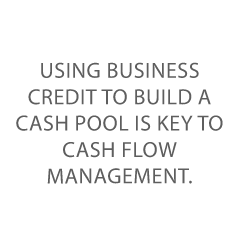
How Crucial is Business Cashflow Management to Surviving Inflation?
What is business cash flow? Is cash flow the same as profit? How crucial is business cashflow management? These are the questions on the minds of a lot of business owners. Keep reading. We have answers.
Managing Business Cashflow is Crucial
Let’s start here. You must manage business cash flow. There is no way around it. This is even more important during inflation, as you never know how far your cash will go by tomorrow. No, cash flow is not the same as profit, but it is just as vital. In fact, without business cashflow management, profit can become non-existent.
Here are some tips for managing cash flow so your business can be thriving and profitable.
Profit First
“Profit First” is a book by Mike Michalowicz. It’s a great read that lays out an innovative new way to manage cash in your business. The profit first mentality suggested that owners take their profit from cash deposits before expenses, rather than paying themselves with what’s leftover. Of course, that is a pretty severe break from what is historically normal. Typically, businesses pay expenses first and consider whatever is left to be profit. With the profit first approach, predetermined percentages of cash deposits transfer into various accounts before expenses are paid.
A Cash Pool Helps
Paying expenses last is scary for sure, especially when inflation is on the rise. However, reserves and a cash pool can help. The key is to have a business credit portfolio. This allows access to cash when you need it in the form of a cash pool, without damaging your personal credit. Access to cash is vital when you never know how far your cash might go from week-to-week. How do you create a cash pool with a business credit portfolio?
Using Business Credit to Build a Cash Pool
Using business credit to build a cash pool is key to cash flow management. There are 3 parts:
- Cash on hand
- Amount available to spend on vendor credit accounts
- Amount available to spend on business credit cards
Vendor accounts allow your purchases on credit. Typically, they are net accounts rather than revolving. The total of all available credit on business credit cards goes toward this “pooled” amount as well. Credit cards can help protect your business, as they may limit exposure with online purchases. In addition, most have fraud protocols that can help protect you from having to pay for fraudulent charges. In contrast, using a debit card leaves very few options for recovery.
Money Management Tools
Managing funds can be overwhelming. There are a number of tools that can help streamline the process. These include companies like Brex, Divvy, Expensify, Ramp, and Lola.
Obviously, it is useful to choose a tool that also helps build business credit. There are not a lot that will do this, but some will.
Brex Business Money Management System
Brex integrates with your company’s existing accounting software. It allows for expense tracking, helps pay bills, and offers more control over spending.
The easiest way to use Brex is to open a Brex Cash account. Everyone with a Brex cash account gets a corporate card that works just like a debit card. It draws from your Brex Cash balance daily as you spend, then reports those draws as payments to Dun & Bradstreet, helping build your business credit score.
Since the Brex cash account balance is the security and the limit, there is no underwriting. They also offer a more traditional card with limits that can go up to 20x higher than that of typical corporate cards. They base approval and credit limits for this card on business financial information, including available cash, spending patterns, and more.
The entire balance will be paid monthly, so it is more like net financing than the cash card, but more flexible as well.
You can get cards for your team members and set individual spending limits, which helps manage spending. There are also virtual card options for online spending.
Divvy
Another option that helps build business credit is Divvy. It is similar to Brex with just a few differences. For example, Brex charges $5 per card for additional cards except premium accounts, which get unlimited cards. Divvy offers unlimited free cards. Other differences include:
- Some software integration differences
- Divvy has an offline mode
- Divvy reports to the Small Business Finance Exchange
Other options for money management tools include Ramp, Lola, and Expensify. They each offer a number of benefits with various pricing options, but at this point they do not report to the business credit reporting agencies.
Business Cashflow Management is Vital, Especially When Inflation is Rising
If you do not manage cash flow, you are doomed from the start. Even if you have all the profit in the world, you cannot survive without cash. Having access to a cash pool is helpful when interest rates and prices are rising. Wondering how to start building a cash flow pool for your business. The answer is to sign up for a free business finance assessment with a Credit Suite expert today!
The post How Crucial is Business Cashflow Management to Surviving Inflation? appeared first on Credit Suite.

